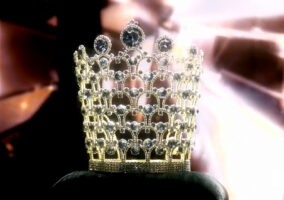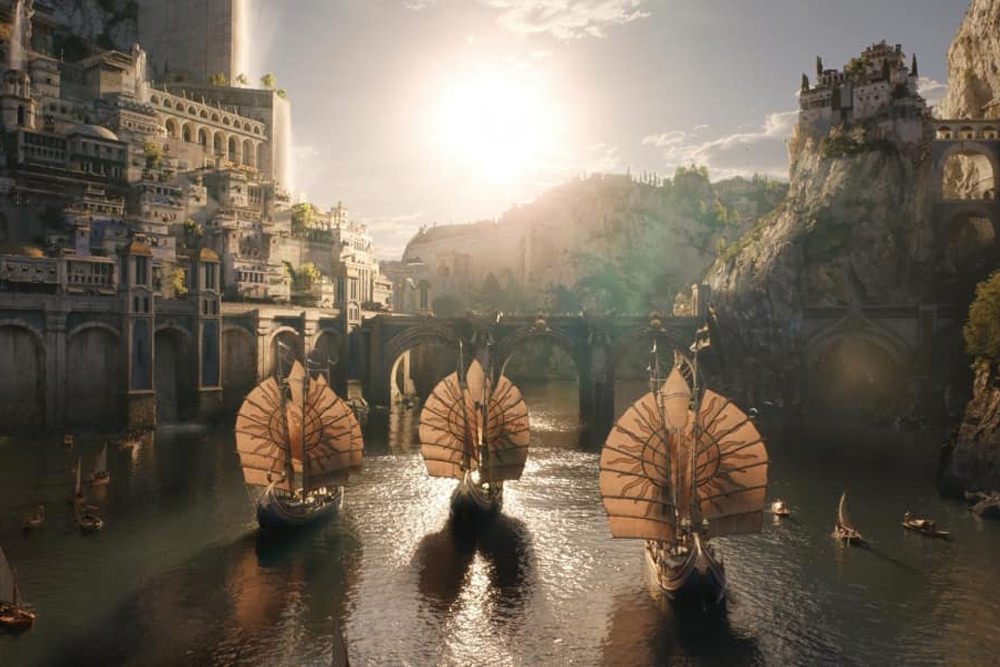
Arondir wakes up a prisoner of the orcs, along with a good deal of his watch ward compatriots as well as the missing Southland villagers. They are put into chains and forced labor. An orc leans into Arondir’s nearly unconscious form and grunts “For Adar,” which is the Elvish word for “father.” It’s a bit of a jolt hearing them speak, even though Tolkien’s did and Jackson’s did. We suppose it was the slightly more monstrous makeup that threw us off. It’s notable here how much these orcs look and sound like the ones from the Jackson films (same sort of working class English/Australian/New Zealand hybrid accent). There was very little reimagining of the design except to take them a bit further away from looking humanoid. We have no point here except to note how the series ties itself to the Jackson films and when or if it will ever truly go off-model.
Galadriel wakes up on a ship with Halbrand. They are both giving serious Han & Leia vibes. Their rescuer/captor is a man called… Elendil. Sometimes, they underline the names just a little when certain extremely important characters are introduced. Elendil was last seen in the prologue to The Fellowship of the Ring fighting Sauron and getting his sword Narsil broken. His name will eventually become Aragorn’s battle cry. Suffice it to say, the timeline that Tolkien established is being wildly compressed here, with characters appearing centuries before their creator claimed, which tends to lend credence to the idea that the Stranger who fell from the sky in Rhovanian is actually Gandalf. The creators of the show have said that this was a deliberate choice to tell a story without having to constantly switch out the cast because some are immortal, some are long-lived, and some have normal life spans, but it has a terrible flattening effect on the tale. Part of what made the various attempts at evil takeovers of Middle Earth is that their would-be conquerors spent centuries and sometimes millennia waging their wars.
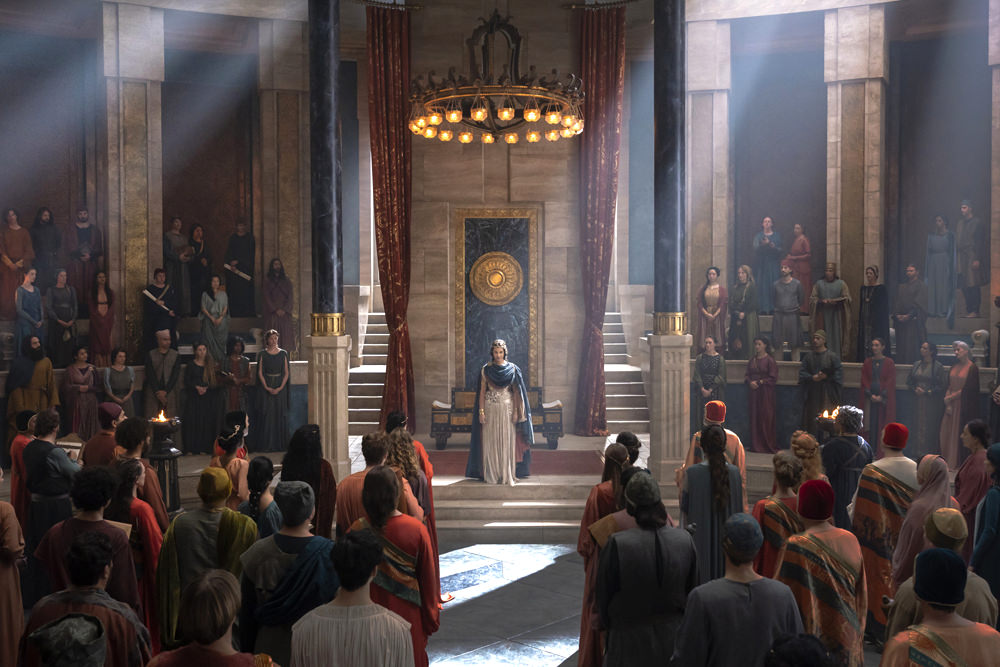
Elendil takes them to Númenor, which is revealed in a gorgeous sequence that’s sort of like if you took the Argonath scene from The Fellowship and injected it with steroids. Having said that, it wasn’t the wrong choice to go completely over the top here. That is pretty much the whole point to Numenor; that it’s the pinnacle of humanity, a time and place of unheard-of beauty and wonder. It’s Tolkien’s take on the Atlantis myth and this constituted one of those moments where The Rings of Power feels like it’s flexing its Amazon muscles and subtly saying “This isn’t Westeros, in case you needed reminding.”
If you noticed the white tree in Númenor during this sequence and wondered if it had anything to do with the white tree of Minas Tirith in the film trilogy or the glowing trees of Valinor from the prologue of the first episode, go ahead and give yourself a cookie. The thing you have to remember about Tolkien is that all trees are the same tree, all spiders are the same spider – metaphorically speaking, but also in somewhat real-world terms as well. The natural world is as intertwined, with as many players and dynasties, as the world of men, Elves and Dwarves. Galadriel does a pretty good job of running down the entire history of the Númenorans in a few minutes, but it’s been well established that she’s adept with narratorial monologues. The ancestors of the Númenorans stood with the Elves in the war against Morgoth, unlike the men of Middle Earth. They were rewarded for their aid by the Valar, the angelic beings who the elves revere, and the people of Númenor remained allies with the Elves for many centuries until they eventually broke off contact with them.
Galdriel and Halbrand are taken to a stunning teal-and-gold throne room for a stoney welcome from Queen Regent Tar-Miriel and her chancellor, Pharazon. She orders Galadriel to “Speak, Elf” and name herself. This version of Galadriel is not the serene magical being of the films. Instead, this younger version is somewhat in line with what Tolkien wrote about her during this period; a bit arrogant and brash. She doesn’t just name herself, she flexes. More than a little. “Galadriel of the Noldor, daughter of the golden house of Finarfin, Commander of the Northern Armies of High King Gil-Galad.” This reveal is met with shock and surprise. Suffice it to say, if someone like Arondir stood before the Queen-Regent, his name would not have the same effect. She is no anonymous elf, but someone who sits extremely high in the hierarchy of elves. She demands passage to Middle Earth and proceeds to insults them. “It was because of the Elves you were given this island.” to which the Queen Regent takes offense. Before the scene escalates to the point where they’re put in chains, Halbrand manages to sweet-talk the Tar-Miriel into giving them a few days’ respite. This doesn’t entirely make sense but it does establish Halbrand as the kind of man who knows how a queen expects to be spoken to, which isn’t insignificant. He lifts Galadriel’s dagger from Elendil as he hugs him and gives it back to her. Total Leia and Han vibes.
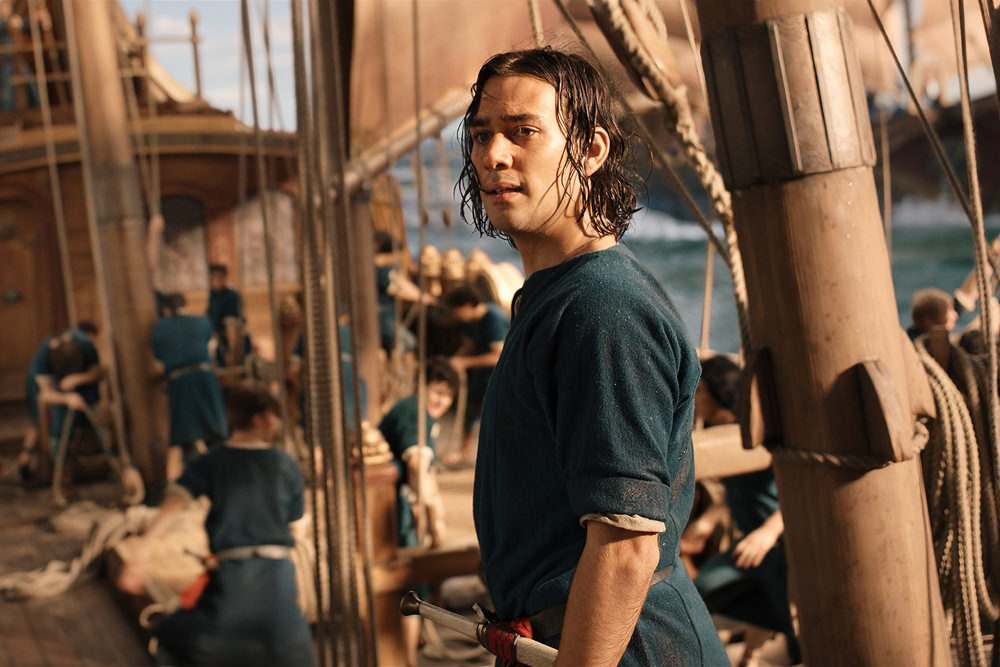
Númenor is clearly a nautical power, as any island kingdom would be, and the script underlines the ways its people pay tribute to it. “The sea is a harsh mistress!” “The sea is always right!” This is very much in line with Tolkien’s belief in the sacredness of nature and how various races in Middle Earth reflect it (Silvan Elves to the woods, Dwarves to the mountains, Hobbits to the meadows). We get an extended introduction to Elendil’s two children, Isildur (also last seen in the prologue to The Fellowship using his father’s broken sword to cut the One Ring off Sauron’s finger and later refusing to throw it into Mount Doom). Here, he is young and brash and has dreams his father doesn’t understand. We also meet Elendil’s daughter (created for this series) Eärien, who is young and sassy and has dre– oh, whatever. This is when The Rings of Power starts losing us a little; when it starts going off on these very “television drama” sorts of subplots involving rather trite and overplayed interpersonal conflicts in which no one spouts Tolkien-esque dialogue and instead everyone starts to sound like the cast of a CW family drama. We think Markella Kavanaugh as Nori does a lot to sell a very basic sort of rebellious dreamer storyline, but when you start getting into Elendil’s kids and their career plans, it sure doesn’t feel much like Tolkien to us. Isildur wants to defer his seafaring service, which is apparently a big deal and the implication in the conversation is that he’s interested in their western shores (which face Aman, the unreachable land where Valinor is located and where Galadriel was supposed to go) .His father reminds him that there’s nothing there for them on the western shores and that the past needs to stay in the past.
Tar-Miriel calls Elendil before her for answers. “The Faithful believe when the petals of the White Tree fall, it is no idle thing,” she notes. “The very tears of the Valar themselves, a living reminder that their eyes, and their judgment, are ever upon us,” which gives some indication of how the Numenorans feel about their one-time benefactors. She questions Elendil about his allegiance and notes that his name can mean “Elf-friend” in the ancient tongue of the Elves. He assures her he’s a loyal servant of Númenor. She counters that a loyal servant wouldn’t have broken with generations of tradition by bringing an Elf to their shores. She hands him a sword which implies he’s to kill her, but he only says later that he has been ordered to keep watch over her.
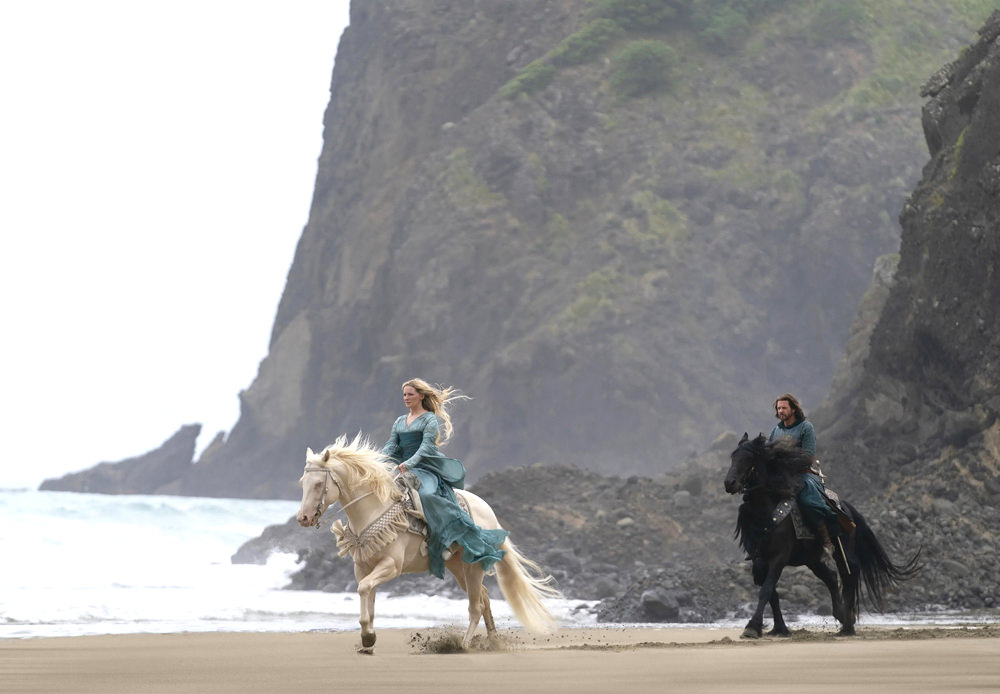
Back in the Southlands, things are very bad for Arondir and his fellow Elves in the work camp, although they all, in true Elf mode, immediately begin to observe for weaknesses in their enemy. They conclude that the orcs can’t abide sunlight (hence the village attacks from underground) and are doing all this digging because “they’re searching for something” and wonder if it’s some sort of weapon. They compare notes and conclude that the orcs have some sort of leader they call Adar, prompting Arondir to wonder why they’d use an Elvish word to refer to him, leading them to wonder if perhaps it’s one of Sauron’s many names. They plan to attack and try to get one of them to escape and send word to the elves. They are ordered to chop down an old tree standing in the way of their progress; an order which the elves find repugnant. “This tree sprang from the earth long before you crawled from whatever wretched place you grew,” Watchwarden Revion spits at them. After the orcs kill Medhor, Arondir’s watch partner, and he dies in Arondir’s arms, he agrees to cut the tree down. He asks it, in Elvish, for forgiveness before he does so.
In Númenor, Galadriel slips free from her guards easily and makes her way to the harbor, where Elendil stops her before doing something that would cause her further punishment. She pulls his dagger on him. “Who is this mortal, who speaks to me as if he has the slightest idea of who I am?” “I have a daughter who runs fast and a son who runs blind. Your eyes bear a striking resemblance to both,” he replies, which is an incredibly cheesy line. And honestly, with all of these literal child-men condescending to her, we can’t really blame her for being short-tempered with all of them. Girlfriend has seen some shit in her time, which is a lot longer than their times. He speaks to her in Elvish, which surprises her, and he notes that there are still plenty of Númenorans who use it and that it’s still taught in their Hall of Lore. She demands to be taken to the Hall of Lore, which is followed by a slow motion sequence of her joyously riding a horse at top gallop. It’s a beautiful scene, if a little cheesy, but you have to commit to the wonder of Tolkien if you’re going to do it right and this was another little moment – like Arondir with the tree – that emphasizes the deep, spiritual nature of the Elves’ relationship with animals and the natural world.
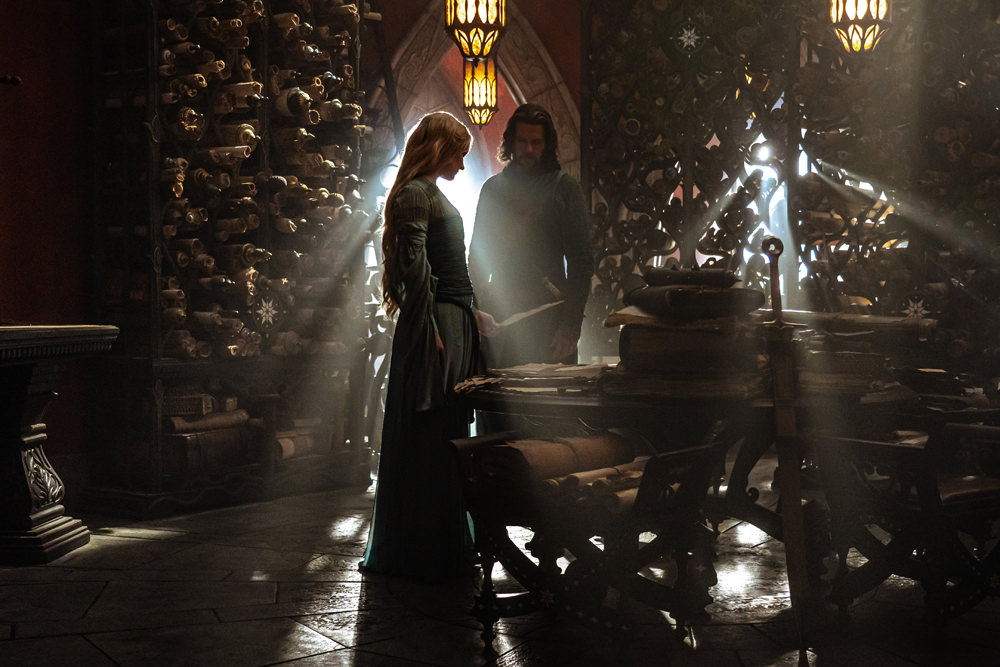
In the Hall of Lore, Galadriel notes that she recognizes the craftsmanship of Elros, who was king of Númenor and Elrond’s human brother. Elendil informs her that Tar-Palantir, the former king, was forced from the throne for being a friend to the elves. Tar-Miriel is his daughter, hence the Queen-Regent title. Galadriel discovers that Sauron’s sigil is actually a portion of a map depicting the mountains of the Southlands. She reads of a plan for Morgoth “to create a realm of their own, where evil would not only endure, but thrive” and that the plan should be carried out by his successor, Sauron.
Halbrand, seemingly desperate to start a new life for himself away from the Southlands, pleads with a local blacksmith for any sort of work, but he is turned away because he needs to be a member of a guild. He starts riling up some locals in a bar before offering to buy them drinks (with what?). They all get drunk together and Halbrand steals one of their guild badges, which strikes us as a fairly unworkable plan in the long run. It’s not even a workable plan in the short run as they corner him in an alley. After they rough him up a little, Halbrand goes full HAM on them, leaving all of them broken, unconscious or wounded within a minute. Once again, this guy appears to be more than he is, in a very Aragorn-esque kind of way. We soon learn that’s truer than we even suspected as he’s taken away by the city guard and imprisoned. Galadriel comes to visit him and muses that he doesn’t belong on this island. When he attempts to argue the point, she reveals that she discovered information at the Hall of Lore about the symbol he wears around his neck, which marks him as a king of the Southlands. We don’t know about this one. Little winking nods to Aragorn’s story make a certain amount of sense. Tolkien certainly liked to repeat motifs and even tales in a partial point about how cyclical history and myths can be. But the rogue exiled king with the pendant that reveals his birthright is a bit too on the nose. On the other hand, it feels like Tolkien, which you can’t say about every character and storyline here. “Your people have no king, for you are him.” “You chafe under the rags of a commoner and the armor that should rest on your shoulders.” It’s notable how much more respect she pays him upon realizing his noble nature. This could be the snobbery the Elves are sometimes accused of by other races, or it could be her recognizing the power of his story and how it can be used as a weapon. After all, it won’t be the last time she has this realization. She doesn’t think their meeting at sea was chance or fate or destiny. She sees a higher power at work.
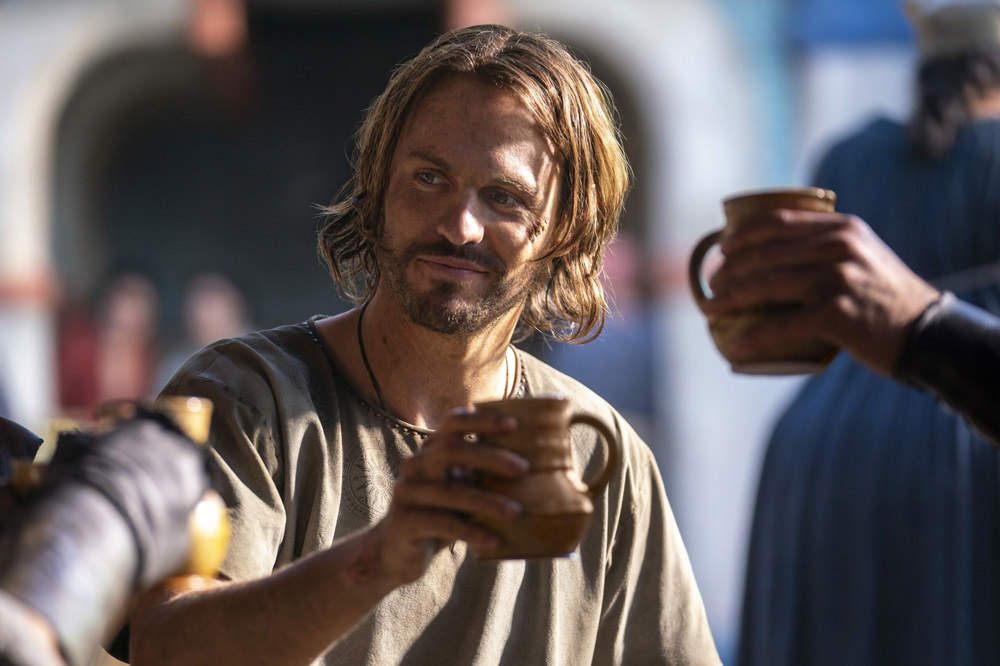
In Rhovanian, the Harfoots are preparing for their great seasonal migration, with chanting and incredibly charming folk costumes. These remain our favorite parts of the show, possibly because they feel like the most appropriate extrapolation of Tolkien. “Nobody goes off trail. And nobody walks alone,” they chant. Largo and Marigold Brandyfoot discuss their past and their future as they come to terms with his injury and how it will impact their chances for survival. He assures her that they’ll make it to the grove by staying at the front of the caravan and relying on Nori. “When that girl puts her head to something,” he assures her mother,”nothing can stop her.” Poppy argues with Nori that “there’s common sense and nonsense” and makes it clear that she thinks helping the “giant with a brackish temper” is a terrible idea. Nori blackmails her with a story about putting fireweed in someone’s toe cream. We love these two together; far more Merry and Pippin than Frodo and Sam. Together they conspire to steal some of Sadoc’s star charts for the Stranger who fell to earth, in a scene that probably went on a little too long, although Poppy’s use of “left,” “right” and “straight” in order to tell Nori where to reach was pretty funny. The Harfoots gather to name their left behind and the reasons they’re no longer with them (stuck in the snows of the mountain pass, taken by a landslide, wolves, bees) in a scene that was poignantly cute and felt a little like Bilbo’s birthday party in The Fellowship of the Ring. And like that party, Gandalf came crashing into it and set off fireworks. Sort of. Maybe. As we said in last episode’s recap, they sure do want you to think this big bumbling being is the future slayer of the Balrog.
The Stranger accidentally sets the star map on fire and reveals himself to the whole caravan. It was pretty funny when he revealed the whole affair by saying the one word he knows. “Nori?” Of course the caravan is scandalized and angry, but you can tell that Sadoc is both intrigued “I’ve heard of beings that turned into stars, but never the other way around” and inclined to be lenient to Nori despite his bluster. Her actions could have resulted in the Brandyfoots being “de-caravaned”, but instead they are told they can take the most vulnerable position, the rear. “Without friends, what are we surviving for?” she angrily demands of the caravan when they tell her that making friends is not the key to their survival. Marigold is beside herself and accuses Nori of consigning her family to the Book of the Left Behind. “Do you see a destiny in this?” she asks incredulously. “Do you think you’re special?” Nori says she knows she’s not special but she knows that her mystery man is. In perfect Hobbit fashion, her mother reminds her that “The tallest milkweed gets snipped.” In other words, don’t go putting on airs. The family starts falling behind during the migration when Meteor Mandalf shows up and offers to help move their tiny wagon by revealing a new word in his limited vocabulary. “Friend.” “This is it,” Nori realizes. “This is how we keep up with the others, all of us. He helps us and we help him.” This too is at the very heart of Tolkien’s writing; the value of friendship and the power it has to change the world. After all, that was the entire point to Samwise Gamgee.
Tar -Miriel ascends a tower to visit her infirm father the king to tell him that his predictions have come true. “The moment we feared, the elf has arrived.”
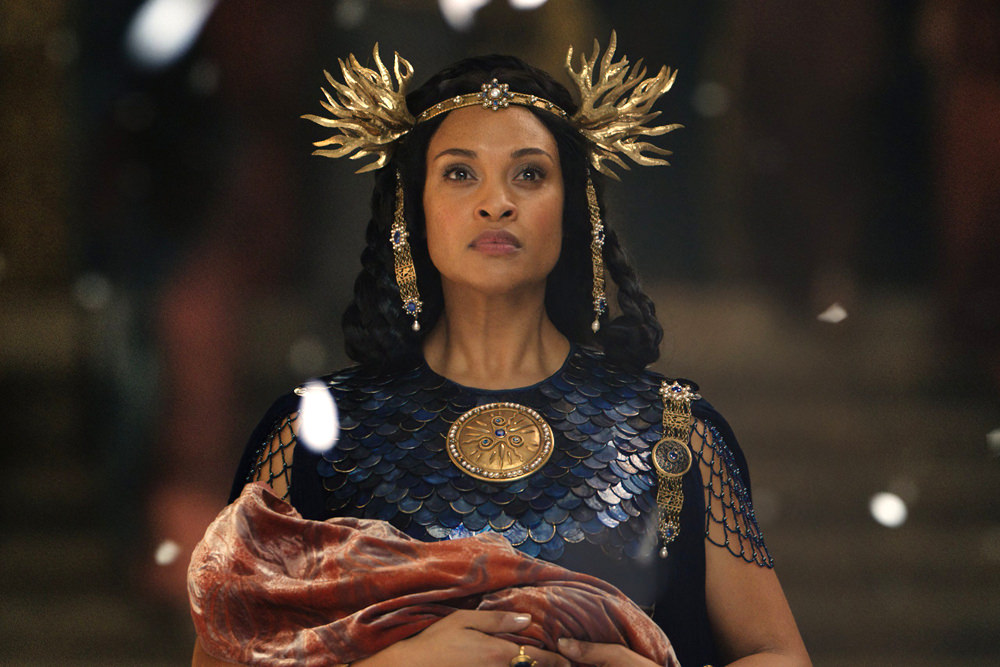
The Elves imprisoned in the orc work camp make a daring play for freedom in a fairly cool action sequence, using their chains and the sunlight itself as weapons. The orcs release a warg and hoo, boy. We’re gonna need a second to get used to this redesign, which looked a little puppety and stop-motion to us. In a brutal scene, he eviscerates several elves . Arondir gets to make some smooth elven moves, but in the end, all of his compatriots are killed, he’s recaptured, presented to their mysterious leader Adar.
The story is really starting to come together, although we maintain that there are too many characters and subplots, some of which grind the narrative to a halt, like the trials and tribulations of Elendil, single father. We also think that the dialogue is beginning to sound less and less like Tolkien with each new subplot and character introduction. There’s a rhythm to Tolkien-esque dialogue that the scripts only occasionally approach (think of Boromir in the Fellowship: “Not with ten thousand men would you do this. It is folly.”). The timeline compression remains a bit troubling, but only to the purists. But everything looks absolutely stunning (which is again, very Tolkien because he envisioned entire cultures with high aesthetic values), and several times an episode, the show does a very good job of reminding the viewer of some of Tolkien’s most important themes and concepts. There have been some falters in these first three episodes, but The Rings of Power remains a highly watchable series of high quality and thoughtfulness.
Venice Film Festival 2022: Julianne Moore in Miu Miu at THE ETERNAL DAUGHTER Premiere Next Post:
Venice Film Festival 2022: BLONDE Star Ana de Armas in Louis Vuitton
Please review our Community Guidelines before posting a comment. Thank you!

